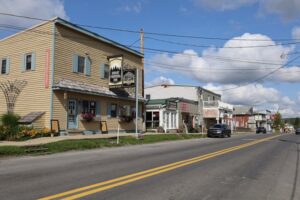
When I arrive at my motel near Davis, West Virginia, I am still unsure about why I am here. There are many reasons, but not all are clear in my mind. I do know that my job as a private investigator in Ohio has nearly burned me out. Seventy-hour work weeks and no vacation in over two years.
I told the owner of our agency that If I did not get some time off, I would say goodbye, and hang out my own shingle. He finally consented, as I have the highest case-closing rate, and he knew that I meant what I said. Two weeks free to roam and remember.
Part of that time, I will shop for a new home in the country. I am tired of the Condo Association telling me what I can plant, what flags I can display, and dozens of other irritants.
I check in at the motel, pay for seven days, and tell the clerk that I might return at any time during that week. I put my luggage in my room and don my backpack, after checking my equipment: tent, water bottles, sleeping bag, meals, a small hip flask of whiskey, collapsible cookstove, minicamera, and my firearm, as the Sods are populated by both black bears and wolves.
I call for an Uber to drive me to the trailhead I have chosen. My driver tells me that it is only the second run he’s made this week. For some reason, very few backpackers have shown up. Possibly, it could be the late fall weather—very cold at night and barely 50 degrees during the day.
Good; the fewer people I encounter, the better. I deal endlessly with distressed, unhappy, and often evil people. He drops me at my trailhead, and I begin my journey to Dolly Sods.
Dolly Sods is like a piece of Canada, transported far south to West Virginia. It shares severe weather conditions, various flora and fauna, and spectacular vistas.
I visited here once, years ago. A friend and I rode our motorcycles down from Ohio. In those days, the only access road to the area we sought was a rough gravel one-track road.
We still talk about escaping the severe storm that appeared out of nowhere, and the frightening hours-long descent to a paved road. The wind-driven rain actually filled our helmets with icy water, and we nearly crashed, several times.
As I hike the steep trail, I am glad that it is not winter. Dolly Sods annually receives 150 inches of snow, on the average. I cross an open area and spot a turkey vulture, floating on the thermals above. I have no intention of becoming his meal!
As I pass wooded areas, I see robins, red-winged blackbirds, and ravens. I startle a ruffed grouse that takes flight, and startles me, also. I halt at a freshwater spring, to fill my empty water bottle, and spot toads and salamanders, A garter snake slithers across the trail. I do not like snakes, but this variety is harmless.
Halfway up the steep trail, I begin to see above me the distorted red spruce banner trees, unique to Dolly Sods. Most have branches on only one side; the result of the fierce winds that cross the mile-high area, thanks to the winter polar vortex. Intense storms are common and can pop up in just a short time, as I well remember. These red spruces remind me of the trees in The Wizard of Oz.
I take a short rest, prep a quick meal, and drink, drink, drink my water. Restored, I resume my steepening climb. To the right, I spot the tops of the cliffs where I plan to camp. I wish that there were stairs and a handrail; the loose soil is unkind to me, as I climb.
Two hours pass, and I finally reach my target. I inhale some water, drop my backpack, and approach the cliff edge, carefully.
Looking downward, I estimate a thousand-foot drop to the heavy tree growth below me. The trees are wrapped by kudzu vines, like thousands of boa constrictors. I take several wide-angle photos with my minicamera. I want to preserve these memories.
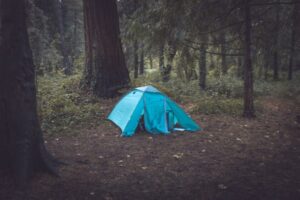
I return to my campsite, set up my blue nylon tent, clear an area for my campfire, and have another meal. It is not haute cuisine, but it replaces the thousands of calories that I burned to arrive here.
Finished eating, I walk to a small pond I had passed earlier. It’s getting much colder as sunset approaches, but I strip, wash away the day’s sweat, and dry myself with the outer side of my windbreaker. I know that pigs don’t sweat, but if one had just made my climb . . .
I gather small fallen branches and twigs and arrange my campfire. Back to the cliff’s edge, to sit and look around. No matter in what direction I look, I see no man-made lights. The darkening sky shows a sliver of moon, and countless stars begin to appear. Other than the whispering of a gentle breeze in some tall grasses behind me, all is silent.
I enjoy a few sips from my flask of whiskey and remember the night when my friend and I were chased off the Sods by that violent storm. Not tonight, it would seem. I return to my campsite, kindle my fire, and snuggle down in my sleeping bag.
Warm at last, an old memory stirs in my mind, but I cannot bring it into focus. Whether it was the six-hour drive, the steep eight-hour climb, or the sips of whiskey, I do not know.
I smother my campfire, and, as my eyes close, dimming the stars above me, the last sound I hear is the distant cry of a nighthawk.
When I awaken, it is full daylight; a bright sun beams above the horizon in a cloudless sky. I see the turkey vulture, circling above my clifftop—ever hopeful. Not today, my feathered friend! I feel completely recovered, prep a meal on my collapsible stove, air out my sleeping bag, and decide to wander about.
I do not worry about leaving my gear behind. Miscreants and malcontents haven’t the fortitude to climb the Sods, just to commit theft.
I wander around for several hours, taking pictures, watching the local birds fly about, and just enjoying the isolation. I never encounter another person.
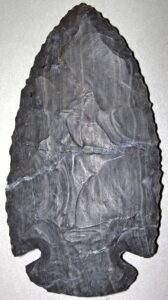
I misstep in some loose soil, and when I bend over to brush the mud off of my hiking boots, I spot something lying in the dirt—an arrowhead! It is a better souvenir than any of my many photos.
I wonder what Native American owned it, and what he was hunting, high up in the Sods. There are deer and bear aplenty in the fields and forests below the Sods. Why tote his harvest all the way back down?
I wonder what tribe he was part of. Impossible to say, as many came and went over thousands of years. I return to my undisturbed campsite for lunch, and watch some migrating eagles pass overhead.
I relax through the remainder of the day. The same old memory is lurking in my mind, but I cannot bring it into focus. I finally smother my campfire and fall asleep, staring at the sliver moon and countless stars.
Well-rested, I prep breakfast, enjoy some freshly brewed coffee, and decide to roam around. I hang my sleeping bag to air out, don my hiking boots, pick a random direction, and start hiking.
I see so many unusual plants. In a heavily shaded area, I spot bleeding hearts. Withered with no blooms so late in the year. But I can imagine how beautiful they must be when it is summertime. I find star violets, some thirty inches tall, with a few flowers still attached.
I stumble upon a collection of pitcher plants, and watch circling insects as they detect the aroma, soon to become dinner for the carnivorous plants. It reminds me that I am hungry.
I leave the forested area, sit on a fallen branch, and empty my water bottle. I cannot remember ever seeing so much natural beauty.
If only that old memory would clarify, I would be completely satisfied with my journey.
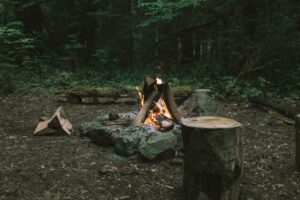
I walk back to my quiet campsite, late in the afternoon. I open my tent to air out, build a small campfire, and prep a meal. I have enough food left to spend another day. I sit on a fallen branch and watch the darkening sky—the sliver moon just rising, the stars beginning to twinkle, and the sun beginning to set behind my tent.
My memory suddenly reaches full bloom!
His name was Nozumu, a young Japanese man my age. We connected as pen pals when I was a sophomore in high school. He wanted to be an astronomer, and I wanted to be a cop. His father was a college professor, mine was a factory worker. We exchanged letters, constantly. I mailed him books about America’s Wild West days. He said that those men had their own way of life. He called it Cowboy Bushido.
He introduced me to Haiku, the Japanese poetry form, and I started writing and sharing them with him. I haven’t written one in many years. Suddenly, the correspondence stopped, and I still do not know why. I never had his telephone number and can only imagine what it would have cost to make such a call, so long ago, even if I did have a number.
I sit there thinking, as the sparks from my fire waft gently upward into the still air, and, as the setting sun lights up my tent, I find my answer. Thank you, Nozumu, wherever you might be.
My house is blue silk
On a cliff of ancient stone
Taste the solitude!
Delmar’s paternal family settled in the mountains of Preston County, West Virginia, in 1700. Delmar was born in Keyser, West Virgina. His father was a coal miner. Delmar has hiked and driven Appalachia from West Virginia to southern Tennessee. The Dolly Sods Wilderness, the focal point in “Mountain Memories,” is one of the most unique areas in Appalachia. From his personal visits, Delmar feels that it deserves to be better-known and further celebrated.
Delmar Knotts is an author whose novels include Hell’s Derecho and Exigent Circumstances. Click on the images below to find out more:
**Featured image credit: Adam Hornyak from Unsplash
***Gallery credits: Jarek Tuszyński – CC 4.0; ForestWander – CC 3.0; Raeky – CC 3.0; Nicolas Raymond – CC 2.0
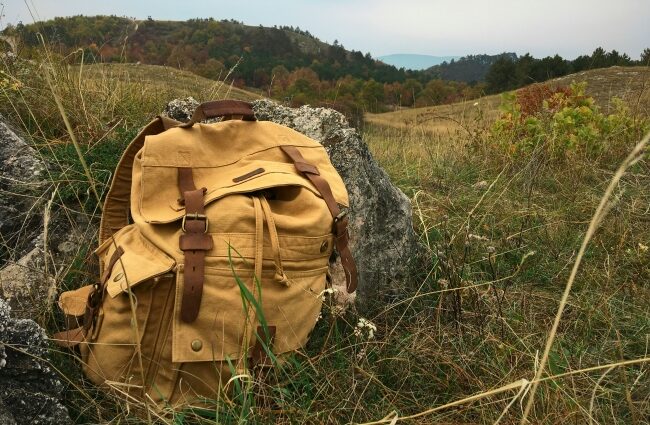











Thank you for your vivid introduction to Dolly Sods. I have biked, rafted and hiked in West Virginia, but was completely ignorant of this hidden gem—something to add to my bucket list!